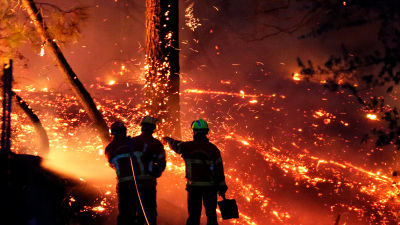World Meteorological Organisation: Two million dead in extreme weather events since 1970

Extreme weather, climate and water-related events have caused 11,778 reported disasters in the last half century, the World Meteorological Organisation (WMO) says.
Their cumulative impact has led to two million deaths and caused trillions of dollars worth of economic damage worldwide, its report released on Monday said.
More than 90% of the reported deaths happened in developing countries while economic damage from floods, storms and wildfires has soared by a factor of eight since 1970, totalling $4.3 trillion (£3.5 trillion).
The number of deaths has fallen dramatically since then, which the WMO said was because of improved early warning systems and disaster management.
The United States alone lost $1.7 trillion (£1.4 trillion), which accounts for 39% of the economic losses sustained between 1970 and 2021 - the years analysed in the WMO's updated Atlas of Mortality and Economic Losses from Weather, Climate and Water Extremes.
However, it is least developed countries and small island developing states who have suffered a disproportionately high cost in relation to the size of their economies.
Data from 2020 and 2021 has been added to the Atlas, which already covers the period up to 2019.
According to the Atlas, there were 22,608 deaths from the most recent two years - a continuation of the declining trend - while economic losses increased further with the majority attributed to storms.
Want a quick and expert briefing on the biggest news stories? Listen to our latest podcasts to find out What You Need To Know...
Professor Petteri Taalas, the WMO's secretary-general, said: "The most vulnerable communities unfortunately bear the brunt of weather, climate and water-related hazards.
"Extremely severe cyclonic storm Mocha exemplifies this. It caused widespread devastation in Myanmar and Bangladesh, impacting the poorest of the poor.
"In the past, both Myanmar and Bangladesh suffered death tolls of tens and even hundreds of thousands of people.
"Thanks to early warnings and disaster management these catastrophic mortality rates are now thankfully history. Early warnings save lives."
Asia accounted for 47% of all reported deaths worldwide - nearly one million - with tropical cyclones being the leading cause.
Bangladesh had the highest death toll in Asia with 520,758, attributed to 281 disasters.
Meanwhile, in Europe, 166,492 people were killed in 1,784 disasters, accounting for 8% of reported deaths worldwide.
Extreme temperatures were the leading cause of reported deaths and floods were the leading cause of economic losses.
The WMO wants to ensure that early warning systems reach everyone on Earth by 2027 and has published its findings ahead of the World Meteorological Congress on Monday May 22 to help speed up this process.
Representatives from United Nations (UN) agencies, development banks, governments and national meteorological and hydrological services responsible for issuing early warnings will meet in Geneva, Switzerland, next week.
The Congress, of which the UK is a member, has said the UN's Early Warnings for All initiative is one of its top strategic priorities this year.
The Partygate: The Inside Story podcast brings you fresh revelations and our whistleblowers in their own words in the definitive behind-closed-doors story of how ITV News uncovered one of the biggest scandals of our era